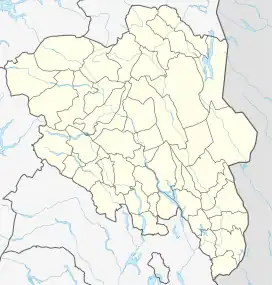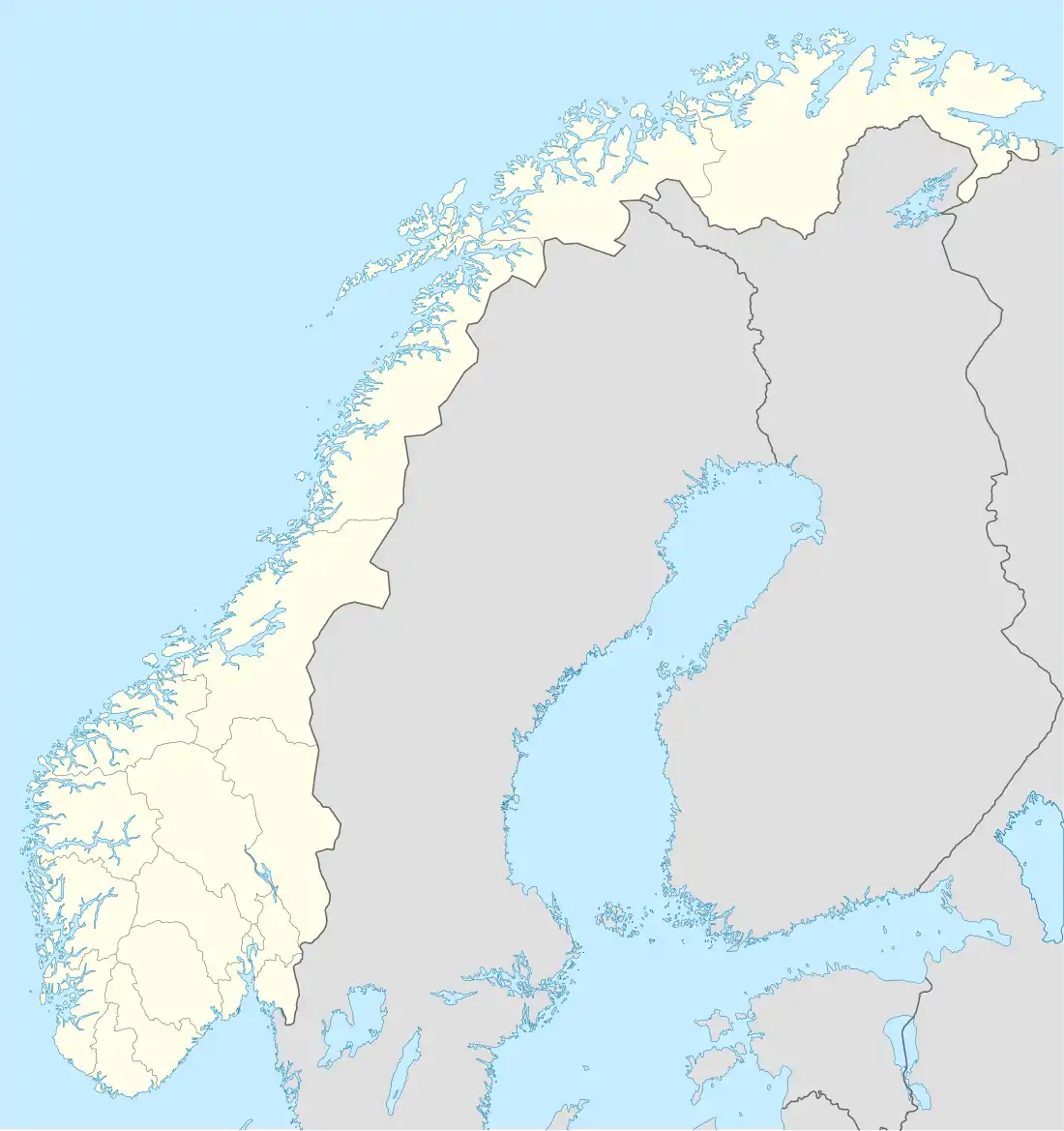Fagernes
ⓘ is a town in Nord-Aurdal Municipality in Innlandet county, Norway. The town is the administrative centre of the municipality as well as the largest urban/commercial centre for the Valdres region. It is located just northwest of the village of Leira and about 5 kilometres (3.1 mi) south of the village of Skrautvål. The 2-square-kilometre (490-acre) town has a population (2021) of 1,951 and a population density of 978 inhabitants per square kilometre (2,530/sq mi).[2][4]
Fagernes | |
|---|---|
 View of the town | |
 Fagernes Location of the town  Fagernes Fagernes (Norway) | |
| Coordinates: 60.98586°N 9.23227°E | |
| Country | Norway |
| Region | Eastern Norway |
| County | Innlandet |
| District | Valdres |
| Municipality | Nord-Aurdal Municipality |
| Established as | |
| Town (By) | 8 Sept 2007 |
| Area | |
| • Total | 2 km2 (0.8 sq mi) |
| Elevation | 360 m (1,180 ft) |
| Population (2021)[2] | |
| • Total | 1,951 |
| • Density | 978/km2 (2,530/sq mi) |
| Time zone | UTC+01:00 (CET) |
| • Summer (DST) | UTC+02:00 (CEST) |
| Post Code | 2900 Fagernes |
Fagernes lies approximately 3 hours northwest of the capital city of Oslo, and is an important destination for tourism in Norway, due to good transportation connections and the nature in the surrounding Valdres valley, including the mountain areas such as Jotunheimen and Spåtind. The European route E16 highway runs through the town. The Strondafjorden lake lies on the south side of the town. Tingnes Church is located in the town.[4]
History
On 14 June 2007 the municipal council of Nord-Aurdal decided to bestow town status on the large village of Fagernes. The decision came into force on 8 September 2007, when Fagernes celebrated the 150th anniversary of its establishment as a village.[5][4]
Name
Fagernes is a compound word made up of fager which means "fair" or "beautiful" and nes which means "headland".
Climate
Fagernes has a boreal climate (subarctic), close to a humid continental climate. February–April is the driest season, while summer is the wettest. The all-time low −36.4 °C (−33.5 °F) was recorded January 1987, and the all-time high 32.3 °C (90.1 °F) was recorded in both July 2014 and August 1982. The average date for first overnight freeze (below 0 °C (32 °F)) in autumn is 25 September (1981-2010 average).[6]
| Climate data for Fagernes in Nord-Aurdal, Valdres 1991-2020 (358 m, extremes 1982-2020) | |||||||||||||
|---|---|---|---|---|---|---|---|---|---|---|---|---|---|
| Month | Jan | Feb | Mar | Apr | May | Jun | Jul | Aug | Sep | Oct | Nov | Dec | Year |
| Record high °C (°F) | 11.6 (52.9) |
12.2 (54.0) |
15.2 (59.4) |
21.5 (70.7) |
27.5 (81.5) |
31.3 (88.3) |
32.3 (90.1) |
32.3 (90.1) |
26.3 (79.3) |
21.7 (71.1) |
14.9 (58.8) |
11.3 (52.3) |
32.3 (90.1) |
| Average high °C (°F) | −3.9 (25.0) |
−1.9 (28.6) |
3.3 (37.9) |
8.8 (47.8) |
14.3 (57.7) |
18.6 (65.5) |
21.2 (70.2) |
19.4 (66.9) |
14.4 (57.9) |
7 (45) |
0.9 (33.6) |
−3.3 (26.1) |
8.2 (46.9) |
| Daily mean °C (°F) | −7.6 (18.3) |
−6.7 (19.9) |
−2.4 (27.7) |
2.8 (37.0) |
8.1 (46.6) |
12.8 (55.0) |
15.4 (59.7) |
13.8 (56.8) |
9.4 (48.9) |
3.4 (38.1) |
−1.8 (28.8) |
−6.6 (20.1) |
3.4 (38.1) |
| Average low °C (°F) | −11.1 (12.0) |
−10.4 (13.3) |
−6.4 (20.5) |
−1.3 (29.7) |
3 (37) |
7.8 (46.0) |
10.7 (51.3) |
9.7 (49.5) |
6 (43) |
1 (34) |
−4.1 (24.6) |
−9.6 (14.7) |
−0.4 (31.3) |
| Record low °C (°F) | −36.4 (−33.5) |
−34.4 (−29.9) |
−29.5 (−21.1) |
−18.2 (−0.8) |
−4.9 (23.2) |
−1.3 (29.7) |
1.5 (34.7) |
0 (32) |
−4.4 (24.1) |
−13.4 (7.9) |
−23 (−9) |
−27.7 (−17.9) |
−36.4 (−33.5) |
| Average precipitation mm (inches) | 44.6 (1.76) |
26.9 (1.06) |
25.1 (0.99) |
27.2 (1.07) |
55.7 (2.19) |
67.2 (2.65) |
87.1 (3.43) |
88.6 (3.49) |
54.6 (2.15) |
52.1 (2.05) |
53.8 (2.12) |
39.9 (1.57) |
622.8 (24.53) |
| Source 1: Norwegian Meteorological Institute[7] | |||||||||||||
| Source 2: NOAA-WMO averages 91-2020 Norway [8] | |||||||||||||
See also
References
- In the Norwegian language, the word by can be translated as "town" or "city".
- Statistisk sentralbyrå (1 January 2021). "Urban settlements. Population and area, by municipality".
- "Fagernes, Nord-Aurdal". yr.no. Retrieved 15 September 2022.
- Thorsnæs, Geir, ed. (4 June 2022). "Fagernes". Store norske leksikon (in Norwegian). Kunnskapsforlaget. Retrieved 15 September 2022.
- Kessel, Dag (15 June 2007). "Fagernes blir by". NRK (in Norwegian). Retrieved 4 July 2007.
- "Første frostnatt – Yr". 25 September 2013.
- "Eklima/met.no".
- "NOAA-WMO normals Norway 1991-2020".

